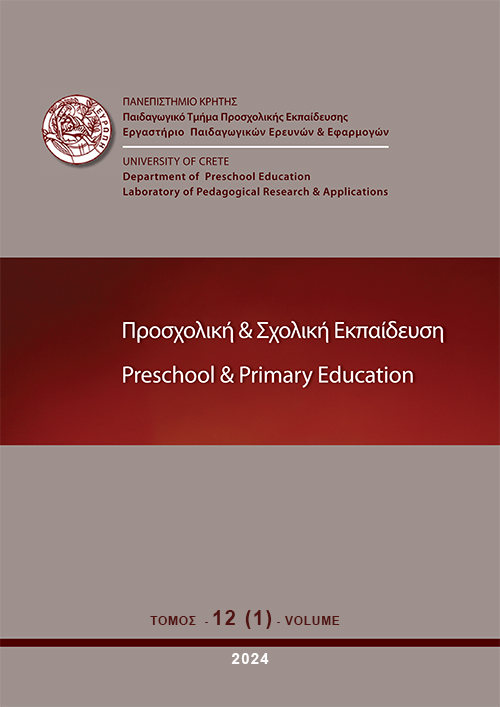The effect of parenting practices on the behaviour of preschool children, from the parents' perspective

Abstract
Emotional and behavioural disorders are common during early childhood, when both cognitive and socio-emotional changes occur. Externalizing problems include aggression, signs of Attention Deficit and/or Hyperactivity Disorder (ADHD), and conduct difficulties, which are becoming more common among preschool children. Internalizing issues, on the other hand, are primarily manifested as worry, despair, and physical discomfort. These early and persistent behaviours are troubling because they may foreshadow future developmental maladjustment. Conversely, prosocial behaviour, defined as the child's ability to share, assist, and demonstrate empathy, protects against both internalizing and externalizing difficulties. One of the most essential aspects impacting children's psychosocial development is family, and more especially parenting style. However, research on the influence of parental practices on children's maladaptive and prosocial behaviours is scarce in Greece. As a result, the purpose of this study was to investigate the effect of parenting style on the emergence of maladaptive and prosocial behaviours in preschool children. An electronic questionnaire (which comprised the Greek versions of "The Parenting Styles and Dimensions Questionnaire" and "The Strengths and Difficulties Questionnaire") was used to collect data from 215 parents (134 of whom were couples) of children aged 4-6 years. Only in terms of authoritative parenting style did the results demonstrate statistically significant differences between mothers and fathers. The authoritative parenting style was found to have statistically significant negative correlations with ADHD symptoms, conduct problems, emotional symptoms, and a positive correlation with prosocial behaviour, while the authoritarian and permissive styles had positive correlations with ADHD and conduct problems. Following that, multiple linear regression was run on all parents, then individually on mothers and fathers. The results showed that among all parents, the authoritarian and permissive parenting styles predicted ADHD symptoms, the authoritarian parenting style predicted conduct difficulties, and the authoritative approach predicted prosocial behaviour. Only the authoritarian parenting style predicted ADHD symptoms among mothers, while the permissive parenting style predicted conduct difficulties and the authoritative parenting style predicted prosocial behaviour. Corresponding analyses of the effect of fathers' parenting styles found that authoritarian parenting style predicted both ADHD symptoms and conduct difficulties, whereas permissive parenting style predicted both ADHD symptoms and conduct problems negatively. The findings confirm that authoritative parenting is associated with prosocial behaviour and is negatively connected with the appearance of externalizing and internalizing problems. The authoritarian parenting style is associated with externalizing behaviour problems, demonstrating that a lack of compassion and warmth, combined with the employment of physical or other punitive tactics, might predispose children to problem behaviours. Permissive parenting is also related with externalizing issues, which may be linked to ineffective control and indifference. Interestingly, there may be disparities in the parenting strategies used by mothers and fathers, which can affect children's behaviour differently. As a result, it is vital that research look into both parents' parenting practices. According to these results, early prevention and intervention programs could aim at increasing effective parenting with the use of authoritative styles by both mothers and fathers. Parenting education programs, for example, might educate caregivers about the effects of parental practices and how to manage troublesome behaviours in children.
Article Details
- How to Cite
-
Efthymiadou, O., & Antoniadou, N. (2024). The effect of parenting practices on the behaviour of preschool children, from the parents’ perspective. Preschool and Primary Education, 12(1), 21–37. https://doi.org/10.12681/ppej.34186
- Section
- Articles

This work is licensed under a Creative Commons Attribution-NonCommercial-ShareAlike 4.0 International License.
Authors who publish with this journal agree to the following terms:
- Authors retain copyright and grant the journal right of first publication with the work simultaneously licensed under a Creative Commons Attribution Non-Commercial License that allows others to share the work with an acknowledgement of the work's authorship and initial publication in this journal.
- Authors are able to enter into separate, additional contractual arrangements for the non-exclusive distribution of the journal's published version of the work (e.g. post it to an institutional repository or publish it in a book), with an acknowledgement of its initial publication in this journal.
- Authors are permitted and encouraged to post their work online (preferably in institutional repositories or on their website) prior to and during the submission process, as it can lead to productive exchanges, as well as earlier and greater citation of published work (See The Effect of Open Access).


